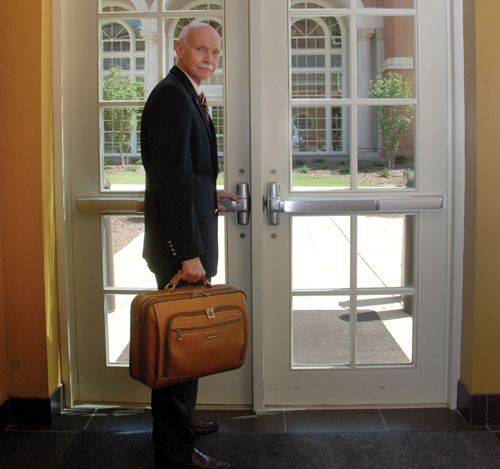His biggest dream, always, was to teach at Auburn . . .
It was a dream that came true for Larry Benefield in 1979 — one that took seed in the early 1960’s when the graduate from rural Handley High School showed up on the Auburn campus as a freshman. The campus was only about 45 miles south of his home in Roanoke, and Benefield had grown up as an Auburn football fan. A starting tackle on his high school squad, he came to Auburn regularly with his parents on football Saturdays.
It was, of course, a different Auburn than the one we see today. Benefield remembers the War Eagle Supper Club as the only place you could buy pizza, the Bonanza Burger as home of the first double decker hamburger, and the Kopper Kettle as the only convenient place for late night eating. The commercial strip between Auburn and Opelika did not exist then — at times it was home to a dairy farm, at others a golf course, amid a widely-spaced scattering of homes. South of Samford Avenue, College Street was a sleepy two-lane that was only lightly developed.
Then as now, the campus was a friendly place. As an undergraduate, the courses could sometimes be less so. Benefield remembers being grateful for a D in Chemistry 103 because it placed him inside the 20 percent of students who passed the class. He relished the classes that clicked for him. While he did not immediately go into civil engineering — considering mechanical or electrical first — he found in civil engineering professor Gene Metz a mentor, whose every class he took.
Metz was a specialist in structures, and so impressed Benefield that he made a decision as an undergraduate to pursue the doctorate, and to teach . . . at Auburn.
It would not be a straight path. When Benefield graduated, in 1966, it was the height of the Vietnam war, and he had a military obligation to fulfill. Rather than being drafted, he volunteered for Air Force officer candidate school, and then went to ’Nam as a combat engineer attached to a Red Horse unit (Rapid Engineer Deployable Heavy Operational Repair Squadron). There he worked on air fields, and was awarded the bronze star medal.
When he returned stateside, Metz — the professor who had made such an impact on him — had retired. Benefield had also been exposed to environmental issues in the service, and as a result, turned his attention to environmental engineering. He completed his master’s degree at Auburn in 1972 in that field.
Following the advice of his peers, and his professors, he went on to receive his Ph.D. elsewhere — at Virginia Polytechnic Institute. The institution later inducted him into the Via Department of Civil Engineering’s Academy of Distinguished Alumni, in ceremonies held in the fall of 2004.
[miniflickr photoset_id=72157630068100354&sortby=date-posted-asc&per_page=7]
